Mastering Blackjack: Strategies to Beat the Dealer
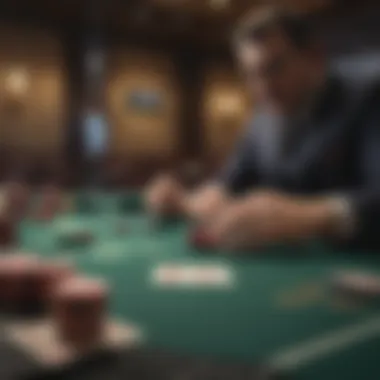
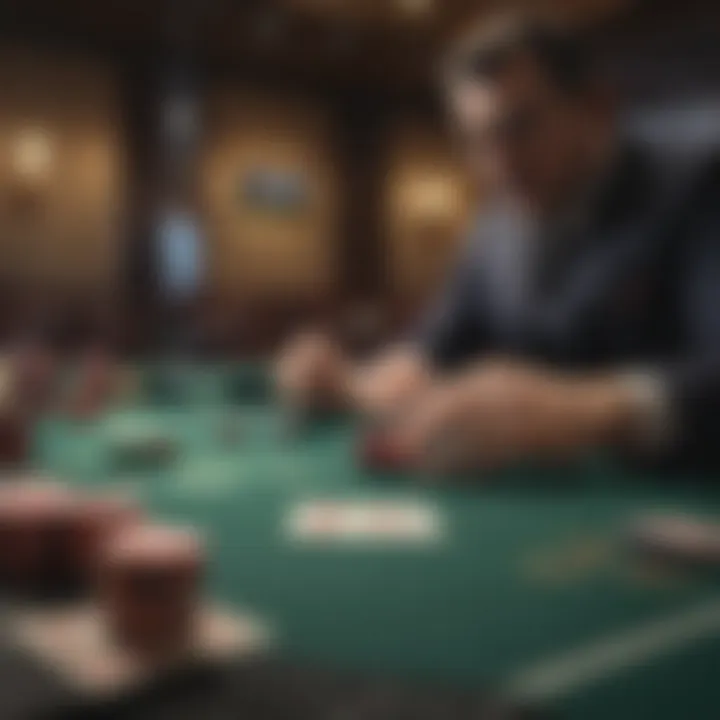
Intro
Welcome to the intricate world of blackjack, where players not only stack their chips but also strategies firmly believed to outsmart the dealer. Blackjack has a long-standing reputation as a casino staple, captivating novices and seasoned enthusiasts alike. Yet, succeeding in this card game requires more than just luck; it is a delicate mix of skill, understanding human behavior, and, crucially, mathematical principles that form the bones of gameplay.
In this guide, we’ll happen upon the various corners of blackjack. From mastering card values to recognizing the dealer's patterns, we will take a thorough look at strategies that are likely to tilt the odds in your favor. Throughout the narrative, we will also discuss the psychological elements that affect decision-making. Rest assured, the aim is to equip you—be it a humble beginner or a grizzled pro—with the insights you need to enhance your skills on the felt.
For whatever reasons you find yourself diving into the blackjack universe, this guide seeks to be your compass, helping you navigate through strategies, mistakes, and tips that can ultimately lead you to success. So, as the saying goes, "All bets are on!"
Let’s kick off our exploration with a look at poker strategies, starting with Texas Hold’em tips and other essential tactics.
Prelims to Blackjack
Blackjack, often viewed as a staple in the backdrop of casino excitement, is not just a game of chance but rather an intricate dance of strategy, psychology, and mathematical finesse. Whether you are an occasional player at family gatherings or a seasoned gambler in high-stakes environments, understanding the foundational aspects of blackjack can significantly tilt the odds in your favor. Notably, this section serves as the launching pad for what lies ahead, equipping you with essential knowledge that will enhance your understanding and appreciation of this beloved card game.
Historical Context
As with many casino games, blackjack has a fascinating history rooted in several cultures. Its origins can be traced back to 17th century France, where it was known as "Vingt-et-Un" or "Twenty-One." The objective back then was simple: beat the dealer by attaining a hand value as close to 21 as possible without going over. The game gradually trickled across Europe, making its way to the United States in the early 19th century, experiencing various rule changes along the way.
Interestingly, the name "blackjack" comes from a special bet that was initially offered to entice players: if a player had an ace of spades and the black jack of spades, they were paid 10 to 1 on their bet. Today, while this bet is virtually forgotten, the name remains pervasive. The game has grown beyond its humble beginnings, evolving into one of the most popular games in casinos worldwide.
Objective of the Game
At its core, the objective of blackjack is elegantly straightforward yet richly nuanced. Players strive to achieve a hand that totals 21 or as close as possible without surpassing it. The game pits participants against the dealer, creating a unique environment where strategy comes into play just as much as luck. Players are dealt two cards, traditionally, while the dealer must follow specific rules regarding their own hand.
In pursuing victory, players face crucial decisions beyond just their immediate hand. Decisions like when to hit, stand, double down, or split can be the difference between a winning streak and a swift downfall. Moreover, understanding the dealer's hidden card and their gameplay tactics is just as vital.
In summary, diving deep into the historical roots and the fundamental objectives of blackjack sets the stage for mastering the game itself, paving the way for advanced strategies and psychological insights to come. This preparation is paramount for anyone looking to enhance their skills at the blackjack table, creating a robust foundation for calculating risks and making informed decisions.
The beauty of blackjack lies not just in the cards you are dealt, but in how you choose to play them.
Understanding the Basics
When diving into blackjack, understanding the fundamentals is as essential as knowing how to breathe. This section unpacks the very foundation of the game, putting you on solid ground before you embark on your quest to outsmart the dealer. By grasping key elements like card values and game rules, along with the dealer's role and actions, you increase your ability to navigate the gaming table with confidence.
Let's break it down further.
Card Values and Game Rules
In blackjack, each card holds a specific value that shapes the outcome of your strategies and bets. The number cards, ranging from 2 to 10, maintain their face values, making them straightforward. On the other hand, the picture cards—kings, queens, and jacks are valued at 10, adding a layer of complexity. The ace can be either 1 or 11, granting players a choice that can alter the game's dynamic significantly.
Understanding these values isn’t just about memorization; it’s about leveraging them to your advantage. Consider this scenario: imagine you have an ace and an 8, giving you either 9 or 19. Depending on the dealer’s face-up card, you might choose to stay on 19, thereby minimizing risk.
The basic rules are equally crucial. The primary goal is to get closer to 21 than the dealer without going over. You have the option to hit, stand, double down, or split pairs, each decision representing a critical juncture in your gameplay.
Remember: Playing with a basic understanding of card values and rules helps to minimize errors and maximize your winning potential.
Dealer's Role and Actions
The dealer isn't merely a facilitator; they are an opponent you need to strategize against. Understanding their role gives you insights into how to play your own hands effectively. In most casinos, dealers follow stringent rules that dictate how they play. For example, they must hit until their hand reaches at least 17. Such rules create patterns that can be advantageous for players.
When the dealer shows an upcard, it influences your decisions significantly. If the dealer displays a low card, you may feel more secured in hitting aggressively, as they are more likely to bust. Conversely, if they reveal an ace, the risk of a strong hand is palpable.
Recognizing the dealer's options and their potential reactions can be the game-changer you need. Use this knowledge to outthink them, as the dealer is bound to a fixed strategy while you can adapt based on your hand and the table dynamics.
In summary, mastering the basics equips you with not only the knowledge required to play but also the confidence to make informed decisions. Whether you’re sitting in a crowded casino or playing a hand online, understanding card values and the dealer’s role puts the odds subtly in your favor.
Strategies for Success
Understanding strategies for success in blackjack can dramatically influence your overall performance at the table. This part of the game dives into techniques that aren't just about luck but rather focus on skill and decision-making. Gaining insight into these strategies empowers players, giving them the tools to make informed choices. By knowing when to stand, hit, or double down, players minimize losses and enhance their potential for winning.
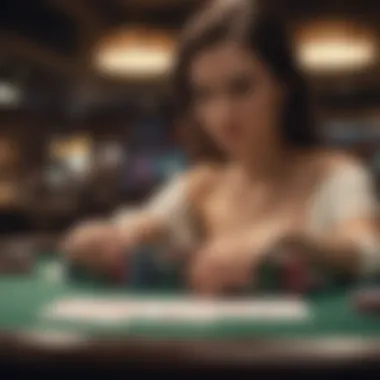

Fundamental Strategy Charts
One of the cornerstones of a successful blackjack strategy is the fundamental strategy chart. Think of it as your personal guide through the jungle of blackjack decisions. This chart outlines the best mathematically proven actions to take based on your hand and the dealer's upcard.
For instance, if you're holding a 16 and the dealer shows a 10, the right move might feel like hanging in there. Yet, according to the chart, surrendering could be your best bet, saving you from a certain loss. Each decision you make can affect the longer-term outcome of your sessions, so knowing the chart can set you apart from the casual player.
Many players might take this chart lightly, thinking they can just wing it or rely on instinct. However, maximizing chances of winning requires commitment to following it closely. It's advisable to familiarize yourself with the chart through practice—like a musician learning to play notes before performing.
"Understanding when to hit and when to stand can feel like navigating through a minefield, but with the right chart, you can avoid missteps."
The Impact of Position
In the world of blackjack, position matters more than one might think. This isn’t just about where you sit at the table; rather, it influences how you play based on the decisions of others around you. Players seated closer to the dealer generally have a different perspective than those sitting further back.
Being in a favorable position—like being in the first spot on the left of the dealer—can offer you critical insights based on what the hands of other players reveal. For example, you might observe other players busting while holding high cards, prompting you to adjust your approach effectively. Likewise, being last to act gives you the chance to see how the dealer plays their hand, allowing you to adapt your strategy accordingly.
Using Basic Strategy to Maximize Gains
With all these strategies in hand, a vital aspect of success is to apply the basic strategy consistently. It's not just about memorizing the cards; it's about employing a disciplined approach to manage your bankroll while taking calculated risks.
To maximize gains, players should remember:
- Stick to the Basics: The essence of playing blackjack lies in making mathematically sound decisions rather than emotional ones.
- Keep a Steady Mind: Like running a marathon, pacing yourself keeps you in the game longer.
- Be Adaptable: Conditions and dealer behaviors may fluctuate, and being willing to flip your game plan can lead to better one-off decisions.
Adopting these strategies isn’t a guarantee of winning, but it certainly increases your odds and solidifies your footing in the thrilling game of blackjack. So, as you gear up for your next hand, remember: success is a blend of knowledge, perspective, and thoughtful execution.
Advanced Techniques
When it comes to mastering blackjack, understanding advanced techniques can set a player apart from the average gambler. These strategies go beyond the basic rules and simple mathematics, diving deeper into the nuances of gameplay that can shift the odds in your favor. Utilizing advanced techniques not only enhances your play but also builds confidence and a more strategic approach at the table. Players willing to invest time in learning these methods often find themselves with a tangible edge over the dealer.
Card Counting
Card counting is perhaps the most well-known advanced technique in gambling circles. It’s not about being some math whiz; it simply involves keeping track of the high and low cards that have been dealt. This helps players determine what cards remain in the deck, thereby allowing them to make more informed betting choices.
Imagine sitting at a blackjack table, and you notice an unusual number of high cards, like tens and aces, that have come out.
- Why This Matters: The more high cards that have been dealt, the better the odds for a player. A high concentration of these cards remaining increases the chances of being dealt a blackjack.
- Basic Method: A common system used is the Hi-Lo method, which assigns values to each card. +1 for low cards (2-6), 0 for neutral cards (7-9), and -1 for high cards (10 and ace). By keeping a running tally, you can gauge when the deck is in your favor.
"Mastering the art of card counting can ultimately transform a player from just another face at the table to a formidable opponent against the dealer."
However, it’s critical to practice this skill away from the table until you can keep your count with ease, ensuring you don't draw attention to your techniques.
Shuffle Tracking
Shuffle tracking is more of a nuanced approach to blackjack, which requires not just a keen eye but also a great deal of patience. This technique revolves around following groups of specific cards as they get shuffled back into the deck. By knowing where high-value cards are likely to end up, players can capitalize on favorable situations.
- How It Works: After a shuffle, if you manage to identify the location of an advantageous group (let’s say a lot of high cards), you can bet more strategically as these cards come back into play.
- Requires Practice: This skill isn’t for the faint-hearted. It involves considerable observation and remembering the deck’s previous composition.
In practice, shuffle tracking could involve observing how the dealer shuffles and potentially identifying the point when high cards are mixed back in. This approach can elevate one's blackjack game to a new skill set, pushing the boundaries of traditional strategy.
Wonging: A Tactical Approach
Wonging, or back-counting, is a clever tactic named after blackjack strategist Stanford Wong. This approach focuses on maximizing your advantage by observing the game without actively participating until the count is favorable. In simpler terms, you sit back, watch the flow of the game, and only step in when the deck comes to a position that is ripe for betting.
- The Essence of Wonging: Players can gauge when the deck is in the player’s favor and jump into the action at that moment—essentially hopping in when the game is hot.
- Benefits: This method allows you to minimize losses by not engaging in unfavorable rounds. The more you know about the deck's composition, the better the chance of walking away a winner.
Just as with other advanced techniques, polish this method in practice sessions before attempting to use it in a casino setting. If mastered, Wonging can position you as a formidable player known for selective and sharp strategy.
Understanding and employing these advanced techniques not only enhances your gameplay but also instills a level of confidence that transcends the casual player. This knowledge, when applied diligently and strategically, can significantly tilt the scales in your favor at the blackjack table.
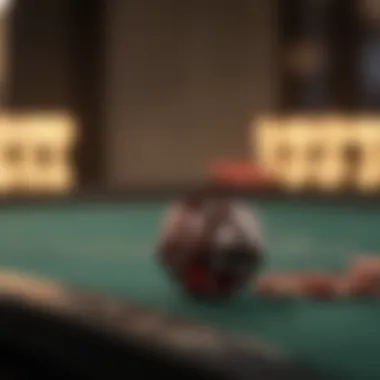
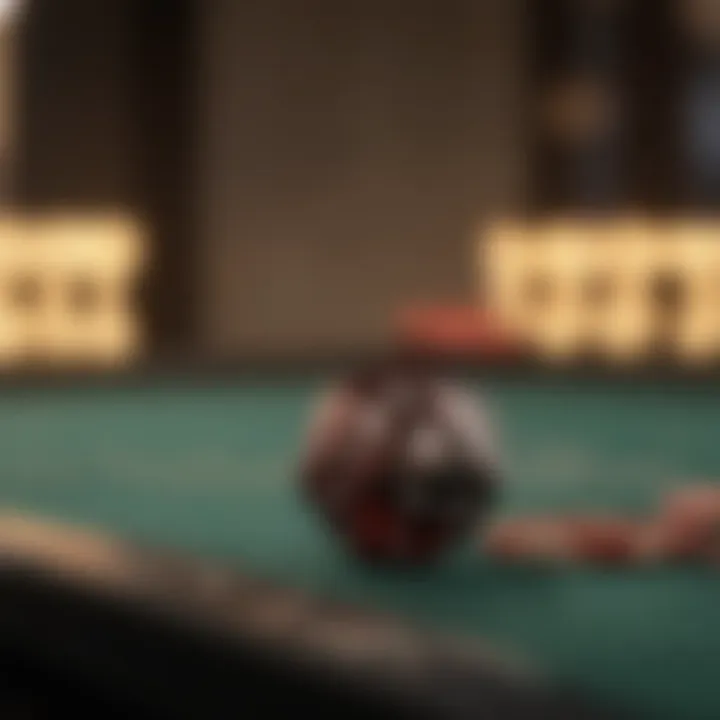
Psychology at the Table
When it comes to blackjack, knowing the rules and perfecting your strategies is crucial, but there’s another layer that holds equal importance: psychology. Understanding the mental dynamics involved at the table can often make or break a game. The behavior you exhibit, as well as how well you read others, can create opportunities or lead to critical mistakes. This section aims to delve into two prime areas: reading the dealer's behavior and managing your own emotions.
Reading the Dealer's Behavior
Observing the dealer at the blackjack table is not merely a passive task; it’s a strategic move that can yield vital insights. Dealers, much like players, exhibit tells—subtle cues that project their confidence, uncertainty, or even intentions.
- Body Language: Notice their posture. Are they relaxed or tense? A tense dealer could indicate that they are potentially overestimating their hand.
- Facial Expressions: A slight cringe or a relaxed smile can hint at the strength of their cards. Pay attention to fleeting expressions that might signal a bluff or confidence in their hand.
- Betting Patterns: Observe how frequently the dealer draws cards versus when they stand. A dealer who seems eager to hit could be nervous and not confident in their total.
By utilizing these observations to your advantage, you may be able to adjust your bets, stand, or hit based on the dealer's likely cards. It’s the difference between gliding through the game and grinding through it.
"The best players are not just good mathematicians, but keen observers of human behavior."
Managing Your Own Emotions
Gamble can be a rollercoaster of emotions. From the thrill of a successful hand to the despair of a loss, keeping feelings in check is essential. Emotion can cloud judgment and lead to impulsive decisions that might backfire severely. Here are some practices to follow:
- Know Your Limits: Before you even sit down to the table, set strict limits for yourself regarding time and money. This will help ensure that you walk away when things go south, keeping your emotions at bay.
- Take Breaks: If you feel the urge to chase losses or act on impulse, take a break. Even a short walk can give your mind the clarity it needs to approach the game from a fresh angle.
- Stay Focused: Concentration is key, especially when the emotions start bubbling. Focus on the game and aim to detach from external pressures or influences.
Balancing your emotions while maneuvering through the psychological aspects of other players—or dealers—is a skill that, once mastered, can greatly enhance your gameplay. By blending psychological awareness with strategic thinking, you tap into a powerful aspect of blackjack that often goes unrecognized.
Bankroll Management
Bankroll management goes beyond simply keeping track of the cash you have in hand; it’s a crucial element of any successful blackjack strategy. Having a solid grasp of how to manage your funds can spell the difference between a night of small wins and playing until the dealer closes up shop. At its core, effective bankroll management ensures that you stay in the game longer, reducing financial risk, and allows you to play within your comfortable limits.
When you hit the casino, it’s easy to get caught up in the excitement and forget just how much you came prepared to spend. Setting limits helps you avoid that sinking feeling in your stomach when you realize you’ve lost more than you intended. By laying down a strict budget before you start playing, you keep your gambling experience fun and within financial bounds.
"A wise player knows their limits—both on the table and within their wallet."
Establishing Limits
Establishing limits can be as simple as defining a budget for your gaming session. Before stepping into the casino or logging onto an online platform, determine how much you are willing to lose. This is crucial not only for setting the parameters of your bankroll but also for your overall gaming strategy.
One method that players find useful is the 50/50 rule. Here’s how it works:
- Split your bankroll into two parts: one for betting and the other for losses.
- For a given session, if you lose the initial fifty percent, you walk away—no ifs, ands, or buts.
- On the flip side, if you win using the first fifty percent, you can either pocket the profit or reinvest a portion of it, thus maximizing your sessions without jeopardizing your entire bankroll.
This approach allows you to play confidently without worrying about your bank account taking a major hit. Consider also setting time limits as part of your strategy. If you’ve spent two hours at the table and nothing is going your way, take a break or call it a night.
Strategies for Responsible Gambling
Responsible gambling isn’t merely a catchphrase; it’s an essential principle that can help players enjoy blackjack while minimizing risks. Here are several strategies for keeping gambling a positive experience:
- Set Win Goals: Instead of only focusing on losses, work towards a target win amount. Once you achieve that, walk away. This prevents the common mistake of seeing an initial win and then losing it all back to the dealer.
- Limit Betting Amounts: Keep your bets at a sensible level relative to your bankroll. A common guideline is to bet no more than 1-5% of your total bankroll on any single hand. This way, even a bad streak won’t decimate your funds.
- Stay Sober: While a drink may help relax you, overindulging can cloud your judgment. Keep a clear mind so you can stick to your strategy without being led astray.
In summary, managing your bankroll is not merely about having enough funds but also knowing how to manage them effectively. This, in turn, promotes healthier gambling habits and prolongs engaging gameplay.
By establishing limits and committing to responsible gambling strategies, you can enhance your overall blackjack experience and potentially increase your chances of getting ahead in the long run.
Variations of Blackjack
The world of blackjack isn't just a one-size-fits-all affair; it's brimming with different styles and flavors that can change the way you play. Understanding the variations of blackjack is crucial for anyone looking to enhance their gameplay and adapt their strategies accordingly. Each variant comes with its own set of rules, payouts, and strategies, which can significantly impact your odds and overall experience at the table. Let's dig deeper into the two primary branches of blackjack variations.
Classic vs. Modern Variants
When we discuss classic and modern variations, it’s like comparing apples and oranges, yet both are satisfying in their own right. Classic blackjack is what most people envision—think of it as the traditional setting with standard rules. Here, players aim to get as close to 21 without busting, and the dealer plays by strict rules like hitting until reaching 17. It’s simple, straightforward, and the foundation upon which more complex variants are built.
On the flip side, modern variants toss in some twists that can spice things up. Variants such as Spanish 21 or Blackjack Switch introduce unique rules that can alter your strategies dramatically.


- Spanish 21: Features a stripped deck, omitting all 10 cards, but offers more options for players, including bonus payouts for certain hands.
- Blackjack Switch: Players can play two hands and switch cards between those hands, which offers strategic opportunities but also has a different set of rules regarding dealer wins.
Both types offer distinct benefits and considerations. Classic blackjack gives you the comfort of time-tested strategies. Modern variants can provide exciting new challenges, but also come with complexities that may require a deeper understanding.
Online Blackjack Platforms
The rise of online gambling has massively impacted how players experience blackjack. Gone are the days when you’d have to dress up and hit the casino floor. Now, players are just a click away from engaging in a game of blackjack, whether on a smartphone or a desktop. Online platforms showcase both classic games and a slew of variations, catering to a wider audience.
Playing online also brings a unique flavor to the experience.
- Convenience: Play whenever you feel like it, even in your pajamas.
- Variety: Access to multiple tables featuring countless variations—from the classics to the unusual.
- Bonuses: Many platforms offer welcome bonuses that can serve as a financial cushion for newcomers and seasoned players alike.
However, with great options come great responsibilities. Players must be wary of how various rules can affect odds. The house edge may vary not only between variants but also between different online platforms. It’s wise to research and read reviews, just like you would check a restaurant before booking a table.
"Knowing what variant suits your style and the platform to play at can tilt the odds in your favor."
In summary, the variations of blackjack present an exciting kaleidoscope of options that cater to a broad spectrum of players. Whether you prefer the tried-and-true classic version or want to test your mettle against modern twists, understanding these nuances can amplify your skills and elevate your overall gameplay. Take the time to learn and adjust as you explore the blackjack universe.
Common Mistakes to Avoid
In the world of blackjack, steering clear of common errors can make or break your game. Often, players are so eager to win that they overlook fundamental aspects of the game, leading to missed opportunities and increased losses. Understanding the most frequent mistakes not only elevates your gameplay but also enhances your ability to beat the dealer consistently.
Misunderstanding the Rules
Many players jump into a game of blackjack without fully grasping the rules. This can lead to poor decisions that compromise their standing at the table. For instance, not knowing the distinction between hitting and standing, or when to double down, can result in unnecessary losses.
It's essential to familiarize oneself with the specific rules of the variant being played. As an illustration, some tables might allow the player to surrender, while others do not. This slight rule change can dramatically shift the odds in the player’s favor or against them. Staying informed about variations such as Spanish 21 or Blackjack Switch helps strategize more effectively.
"A player who knows the rules is halfway to success at the blackjack table."
To avoid misunderstanding, consider these pointers:
- Read the Rules: Before engaging, take time to peruse the rules displayed at the table.
- Ask Questions: Don’t hesitate to ask the dealer about specific rules or clarifications. They’ll often provide help.
- Practice Online: Use free online blackjack games to familiarize yourself with various rules without financial commitment.
Ignoring the House Edge
One of the gravest errors a blackjack player can make is to ignore the house edge. The house edge refers to the mathematical advantage that the casino has over the player in any given game. This factor is vital because it sets the baseline for the likelihood of winning.
An example might clarify: if you’re playing at a table with a house edge of 1%, your chances of losing money over time increase. Many players, however, fail to account for this and thus make poor betting decisions.
Understanding how to mitigate the house edge is crucial for effective bankroll management. Here are ways to reduce it:
- Choose Tables Wisely: Look for tables that offer favorable rules, such as a single deck being used or allowing double downs after splitting.
- Stick to Basic Strategy: Adhering to the basic strategy chart helps minimize the house edge further by ensuring statistically sound moves.
- Be Mindful of Side Bets: While they might appear enticing, side bets often carry a significantly higher house edge.
In summary, awareness of these common mistakes is paramount for any serious blackjack player. By understanding the rules thoroughly and recognizing the impact of the house edge, players can shift the odds more in their favor, paving the way for a more successful and enjoyable gaming experience.
Final Thoughts
As we wrap up our exploration into the world of blackjack, it becomes evident that mastering the game goes far beyond merely learning the rules or card values. In this section, we will outline the importance of continuous improvement, emotional resilience, and adapting to the ever-evolving dynamics of blackjack. For both novice players and seasoned veterans, acknowledging the intricate relationship between knowledge and success can dramatically influence one’s gameplay.
Continuous Learning in Gameplay
In any domain, staying stagnant equates to moving backward. Blackjack is no exception. The game constantly evolves, whether due to changing strategies, variations in rules across casinos, or the introduction of new technology that reshapes how games are conducted. For players, this means continuous learning is not just beneficial; it's essential. Here are some strategies advocated by experienced players:
- Study Different Variations: Each variant of blackjack may have unique rules that could impact your strategy. Familiarizing oneself with these rules can provide a significant edge during gameplay.
- Utilize Apps and Simulation Tools: Technology today allows players to practice their skills without the need to be in a casino. Various applications help simulate blackjack scenarios, allowing you to test strategies without financial risk.
- Join Forums and Discussion Groups: Engaging with fellow enthusiasts on platforms such as Reddit can provide diverse perspectives. Sharing experiences and strategies can spark innovative ideas that might not be covered in standard guides.
Despite grasping strategies, it’s equally necessary to understand and manage your emotions while playing. Letting emotions rule your decisions can lead to costly errors, especially in high-stake situations. The journey of improving one's blackjack skills never truly ends, and thus, a commitment to learning is fundamental.
End and Path Forward
As we sum up this guide, it’s important to highlight the main takeaways that every player should keep in mind:
- Know the Game Inside Out: A deep understanding of rules and strategies lays the groundwork for effective gameplay.
- Psychology Plays a Key Role: Observing the dealer and managing your own emotional state can often determine the outcome of a hand.
- Practice Responsible Gambling: Recognizing your limits and maintaining a healthy bankroll is essential for long-term enjoyment of the game.
"The road to mastery is paved with consistent effort and an insatiable thirst for knowledge."
Now, as you embark on your journey to outsmart the dealer, remember that each hand is a new opportunity to apply everything you’ve learned. Whether you are seated at a table in a bustling casino or playing online at your own pace, the journey is as rewarding as the destination.















